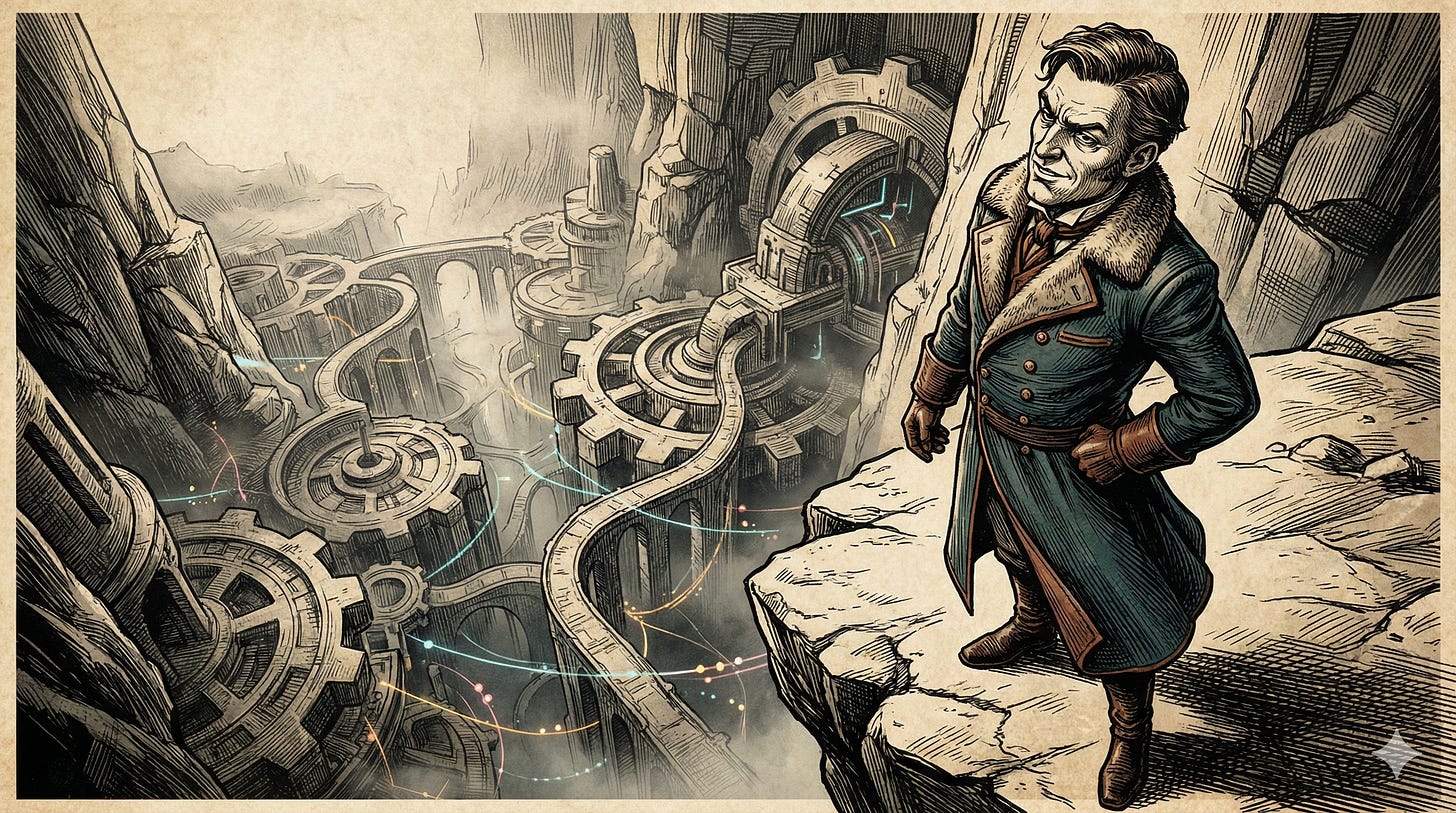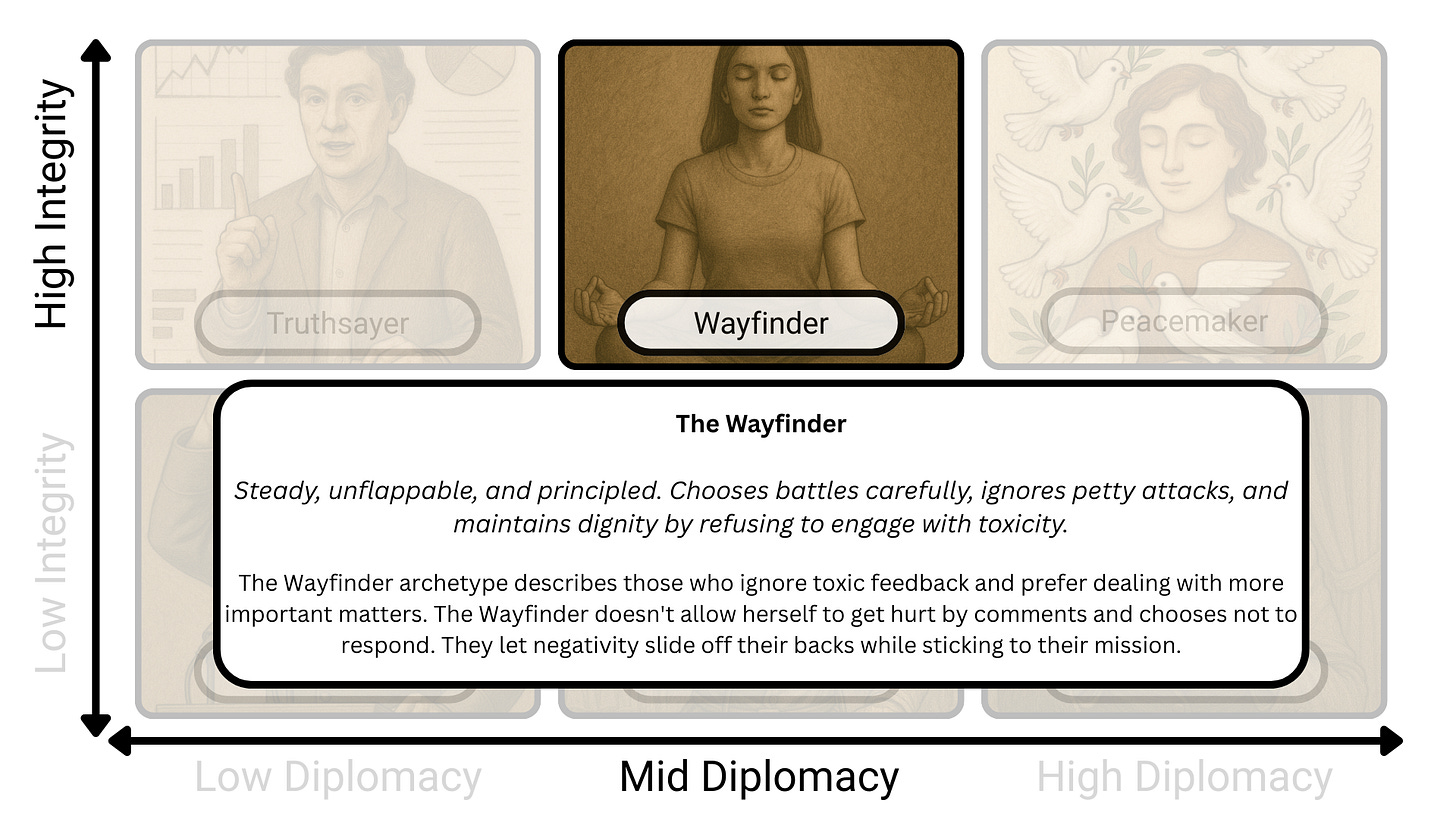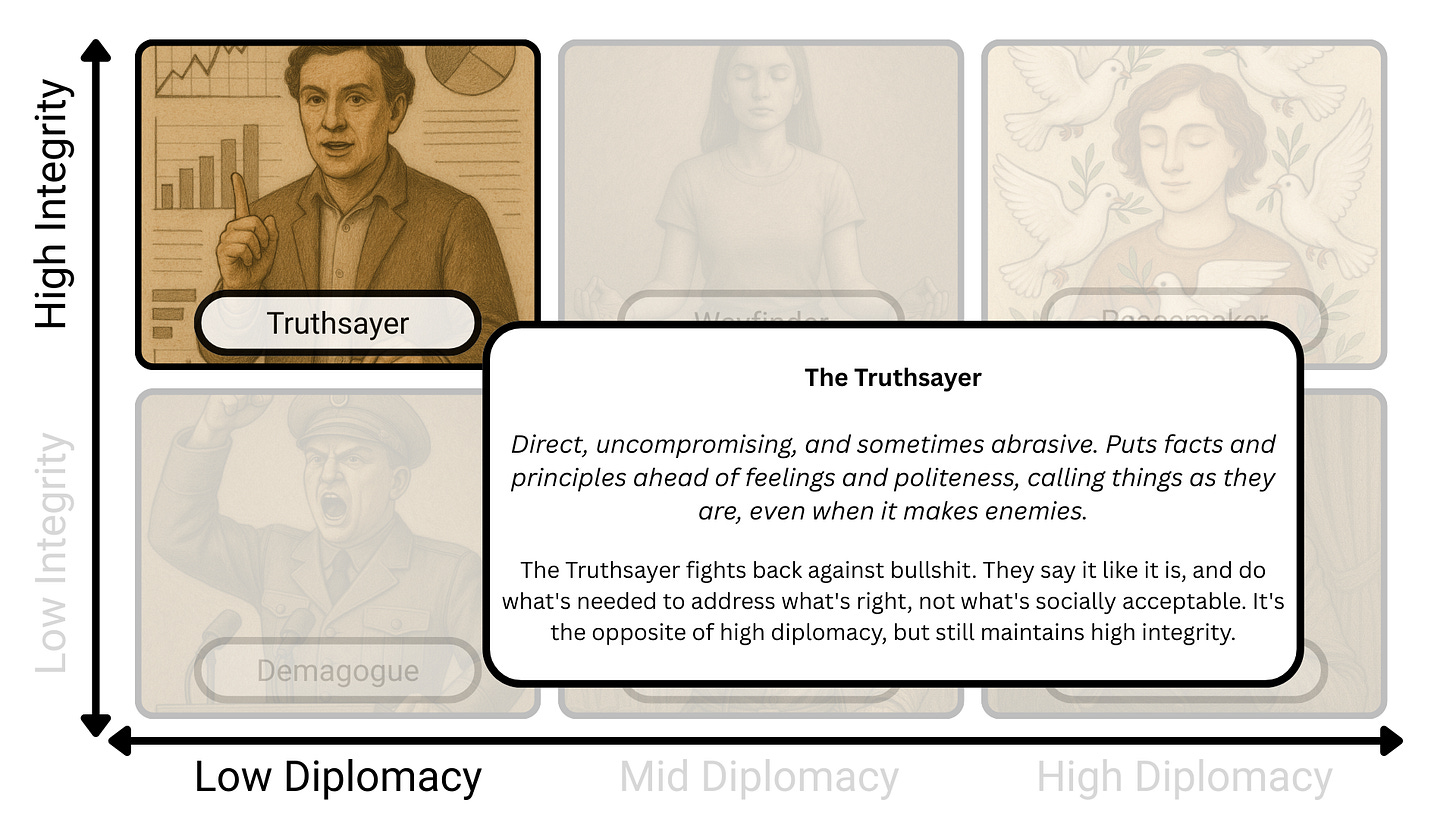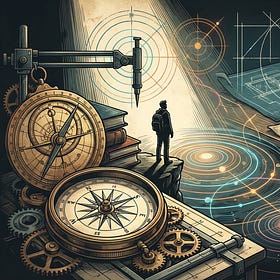“You are arrogant, condescending, and disrespectful.”
Six Archetypes for Giving and Taking Feedback—From Peacemaker to Demagogue
Criticism stings—but not all critiques are created equal.
Meet six archetypes for giving and taking feedback, from the Peacekeeper to the Demagogue, and learn when to ignore, engage, or fight back.
"You have quite a reputation," said our host Lenka Pincot to me at the Agile 2025 conference, just before the start of a panel discussion with Laura Powers and Heidi Musser.
With a wide grin, I replied, "Nice. I hope it's not all good."
"No, it's not," Lenka admitted with a friendly chuckle.
As an outspoken author and public speaker with more than a handful of controversial viewpoints, I've received my share of criticism—some of it undoubtedly deserved, much of it probably not. Someone hurled the most recent negative feedback at me in a community forum:
"With all due respect, you are arrogant, condescending, and disrespectful."
The irony of the first four words of that sentence was not lost on me.
I Hate Criticism (And So Do You)
It may shock my detractors, but I'm still human. Criticism hits me like it hits everyone else—right in the ego, with surgical precision.
No matter how much praise floods in during events or social media feeds about my books, talks, or leadership exercises, it's always that one negative comment that can hijack my entire week. The nastier the outburst, the longer it lingers.
The ad hominems sting most. I share a strong opinion on a topic, and someone calls me dumb, ignorant, unoriginal, or—in one rather creative case—a magpie stealing other people's work. When I push back on these personal attacks, I'm told I'm "unable to handle feedback." My response is usually that my capability of dealing with feedback correlates directly with the competence of its delivery.
I've always treated negative comments like ketchup stains on an otherwise clean white shirt. They ruin the entire experience of having what should be an enviable, unblemished reputation. I was only stating the truth! Why the personal insults?
I'm not ashamed to admit I've lost sleep over particularly nasty verbal engagements. Comments directed at me spin through my mind all night: "Why are they doing this?" "How can they say that?" "Why are they being so hateful/unfair/toxic?"
After yet another accusation of disagreeable character (apparently I'm "arrogant, condescending, and disrespectful"), I spent time during my vacation in Tuscany reflecting on criticism—or rather, on my handling of it. Nothing beats cricket chirping on a hot summer evening, chilled cappuccino in hand, for getting the introspective juices flowing.
How should I deal with unsolicited criticism that's poorly articulated and possibly undeserved? (Ironically, some experts consider unsolicited feedback itself disrespectful, but let's leave that aside for the moment.)
Option 1: Ignore the Critics
Throughout history, people wiser than me have advocated for ignoring negative criticism.
"You will never reach your destination if you stop and throw stones at every dog that barks," reportedly said Winston Churchill.
"Never wrestle with a pig. You'll both get dirty, and only the pig likes it," is advice often attributed to George Bernard Shaw.
"Never argue with stupid people. They will drag you down to their level and then beat you with experience," said Mark Twain.
"Don't feed the trolls" remains well-known advice for anyone in online forums.
The idea resonates with Buddhist and Stoic mindsets: instead of worrying about things beyond our control (other people's opinions, external events), we should focus energy only on what's within it (our thoughts, beliefs, actions). If we care about criticism, we're attaching ourselves to others' perspectives. When we choose to derive our identity from what others say about us, we become slaves of public opinion.
Strength of character means not wasting time and energy on what you cannot control. Don't let toxic critics distract you from your mission. Arguing is pointless because you can never win an argument with trolls. They want only to slow you down. Let them talk. The Law of Conservation of Energy suggests you have more important matters to attend to.
THE WAYFINDER (Medium Diplomacy, High Integrity)
Famous Wayfinders: Keanu Reeves, Oprah Winfrey, Dana Scully (X-Files)
Option 2: Understand the Critics
But what if the critics have a point?
Valid criticism sometimes gets buried under piles of ad hominems and logical fallacies, but that doesn't mean the detractors are mistaken. Most people are just terrible at expressing their frustrations through constructive feedback. Just because they suck at it doesn't mean we can't show them how it's done. Perhaps I'm not really dumb, ignorant, or unoriginal, but something is bothering them. The only way to find out is to take the debate in the opposite direction.
"When they go low, we go high," said Michelle Obama at the 2016 Democratic National Convention.
"Honest disagreement is often a good sign of progress," said Mahatma Gandhi.
"Don't raise your voice; improve your argument," said Desmond Tutu.
"Turn the other cheek," Jesus told his followers during the Sermon on the Mount.
Peaceful and spiritual leaders throughout history have offered timeless advice on dealing with violent criticism. They certainly had plenty of experience with it.
Non-Violent Communication (NVC) provides one way out of mutual character destruction spirals:
"This is what I hear you said." (observation)
"This is how it makes me feel." (feeling)
"This is what I need from you." (need)
"This is what I ask of you." (request)
Management 3.0 offers a slightly different Feedback Wrap approach:
"This is the situation I'm in." (context)
"This is what I hear you said." (observation)
"This is how it makes me feel." (feeling)
"This is what is valuable to me." (need)
"This is my advice to you." (suggestion)
With these techniques, you invite the other party to rise above hate, turning a vicious cycle into a virtuous one—a spiral that goes upward rather than downward.
THE PEACEMAKER (High Diplomacy, High Integrity)
Famous Peacemakers: Nelson Mandela, Michelle Obama, Mahatma Gandhi
Option 3: Fight the Critics
But what if the critics are bullies and idiots?
What if it's perfectly clear the other side consists of tyrants and miscreants spouting pure bullshit?
My high school years weren't exactly happy. I was preyed upon by bullies and quickly learned that "turning the other cheek" and "ignoring the trolls" only gets interpreted as cowardice. Tyrants gleefully use passive stances as endorsement of their attacks. Non-violence can be the confirmation bullies need when seeking easy targets.
Bullies don't stop when you huddle in a corner, hoping it'll blow over. You cannot always ignore toxic behavior, because not responding only breeds more. Perhaps those formative teenage years resulted in my personal mantra: I don't take crap from bullies and I don't take bullshit from idiots. Sometimes, you need to punch back.
"The only thing necessary for the triumph of evil is for good men to do nothing," said Edmund Burke.
"When tyranny becomes law, rebellion becomes duty," said Thomas Jefferson.
"The ultimate tragedy is not the oppression and cruelty by the bad people but the silence over that by the good people," said Martin Luther King Jr.
Speaking up against tyranny isn't just personal tactics. Complexity science validates it: Tit-for-Tat is historically the best-known and most robust strategy for fostering cooperation among complex systems in iterated games. It's one of the most effective, intuitive, and influential cooperative strategies in game theory, and by far the simplest to understand.
"I play nice as long as you play nice. But if you don't play nice, I hit back with equal force. Then, I immediately revert to playing nice, provided you do the same."
Tit-for-Tat isn't about aggression for aggression's sake; it's about reciprocal cooperation punctuated by reciprocal retaliation. It also underlines why self-defense is legitimate in virtually all legal jurisdictions worldwide.
Tit-for-Tat is the basis of my online reputation.
When people write nonsense, I point it out. When authors try to bully me, I slap back immediately. While I recognize this approach won't make me friends, experience tells me it leads to results. In many cases, idiots shut up and bullies back down, which is all that matters to me. Granted, it doesn't always work, but there's this super-handy feature on social media platforms I happily reach for as a last resort. It's called Block.
I'm not on this planet to make friends. I'm here to make an impact.
THE TRUTHSAYER (Low Diplomacy, High Integrity)
Famous Truthsayers: Greta Thunberg, Nassim Taleb, Alexandria Ocasio-Cortez
I’m a seasoned founder, intrapreneur, and former CIO who builds maps and models for Solo Chiefs navigating sole accountability in the age of AI—informed by plenty of scar tissue. All posts are free, always. Paying supporters keep it that way (and get a full-color PDF of Human Robot Agent plus other monthly extras as a thank-you)—for just one café latte per month. Subscribe or upgrade.
A Matter of Perspective
But what if there's no criticism to respond to? What if you're first to offer a perspective on a topic? Should you lean toward Peacemaker, Wayfinder, or Truthsayer?
That depends on how much you prioritize facts versus feelings. When feelings matter more than facts, you're a Peacemaker. You aim to keep and improve cohesion and understanding because you believe collaboration and harmony are key to progress. First, keep everyone happy. Then, work toward improvement.
When facts matter more than feelings, you're a Truthsayer. You aim to know and share truth over falsehood because you believe getting closer to truth is prerequisite for progress. First, identify what needs fixing. Then, try to get people on board—if they're still willing to talk.
In sociology and anthropology, researchers distinguish between high-context and low-context communication. This explains how people across cultures communicate. Dutch, Scandinavian, and American cultures are low-context. Communication tends to be explicit, direct, and straightforward. High-context cultures (Japan, China, Arab countries) rely heavily on nonverbal cues, implied meanings, and shared understanding. In high-context cultures, opinions are rarely shared directly.
Neither Peacemaker nor Truthsayer approach is intrinsically better. The difference is cultural and context-dependent. I'm obviously an avowed Truthsayer. I'm Dutch, after all, and it's in Dutch culture not to beat around the bush. Other people's feelings can be relevant to us, and we might even take them into account—if we feel lenient—but we don't see others' emotions as our responsibility.
Some readers are delighted to learn that while many cultures use the expression "not stepping on other people's toes," the Dutch often take the opposite position with our own qualification for those easily offended: "Some people have long toes." It shows that openness versus rudeness is just a matter of perspective.
No, People Are Not Their Behaviors
In conversations with coaches and consultants about feedback and criticism, I often encounter the notion of distinguishing between a person and their behaviors.
Some say we should be tough on behavior while soft on character. Labeling information and actions is good; labeling people and personality is bad. Judge the action, not the actor. For example, it's alright to discuss ignorant opinions, but not okay to refer to ignorant people. It's fine to claim certain voting behaviors are deplorable, but not so fine to refer to voters as deplorables.
"Hate the sin, love the sinner," is an expression often attributed to Mahatma Gandhi.
"When we speak evil of others, we generally condemn ourselves," said Publius Syrus.
"People are capable, at any time in their lives, of doing what they only dream of," said Paulo Coelho.
The principle of "What you do is not who you are" reveals itself in how we talk about ourselves. Whenever we feel ashamed of transgression or unethical behavior, we might say, "What I did is not who I am. I failed in my actions, but I'm still a good person." The distinction between behavior and character allows people to think of themselves as having best intentions despite behavioral patterns that suggest otherwise.
In psychology, the Fundamental Attribution Error describes our tendency to overemphasize personality-based explanations for others' behaviors ("They're idiots!") while under-emphasizing situational influences. Conversely, when evaluating our own behavior, we attribute failures to situational factors rather than personal flaws ("The situation made me do something stupid"). The distinction—being tough on behavior but soft on character—is a way to counteract this cognitive bias.
Recognizing that people sometimes aren't what they say or do is foundational to building constructive dialogue. A kind soul may sometimes act unkindly, but a competent conversationalist may guide such a person back to their default state of kindness.
THE MANIPULATOR (High Diplomacy, Low Integrity)
Famous Manipulators: Eva Perón, Cercei Lannister (Game of Thrones), Frank Underwood (House of Cards)
Yes, Sometimes People Are Their Behaviors
I was once a victim in a violent, abusive relationship. You'll forgive me for not thinking back on that ex-partner with kindness and understanding. I believe I'm fully within my right to refer to that person as an abuser, not just someone "with abusive behaviors."
When aggressors are abusive, is it their victims' job to coach them back to kindness? When someone has been lying, can we not simply call them out for being a liar? When someone has sexually violated a person, isn't it the victim's right to refer to their aggressor as a rapist? When a judge convicts people of criminal behaviors, can we not simply talk about them as criminals?
In systems theory, we sometimes refer to the POSIWID principle:
The Purpose Of a System Is What It Does.
Humans are systems. Internal processes are irrelevant to the environment as long as they don't translate into noticeable action. In other words, the purpose of a human is what that human actually does, not what they hope to be doing. You're only an artist when you've actually created art. When you're only dreaming about making art, you're not an artist; you're a dreamer.
"If it looks like a duck, swims like a duck, and quacks like a duck, then it probably is a duck."
The POSIWID argument is likely used more by Truthsayers than Peacemakers. Truthsayers might claim there's no point discussing that a person isn't really who they appear to be. What people think and feel is irrelevant to the rest of the world. We can only enjoy, suffer, and judge observed behavior.
This perspective suggests nothing's wrong with using linguistic shortcuts when talking about others. "You're an artist" is perfectly acceptable shorthand for "From my perspective, you come across as someone who makes art." Likewise, "You're a fool" is convenient shorthand for "From my perspective, your behavior comes across as foolish." The elaborate expressions might be more accurate and grounded, but for practical purposes, the outcome is the same. Why bother with extra words?
When you behave like something, you are that something.
THE DEMAGOGUE (Low Diplomacy, Low Integrity)
Famous Demagogues: Donald Trump, Dolores Umbridge (Harry Potter), Regina George (Mean Girls)
Play the Long Game
Years ago, a fellow author and speaker at a conference called me a liar and a thief. The attack came out of nowhere and I was flabbergasted. I admit to many flaws, but lying and stealing aren't among them. In fact, I explicitly credited the author in my first book, Management 3.0, referring to an idea I'd learned from him. So what was the attack about? I had no idea.
I see myself as a firm Truthsayer: I always try to speak the truth—perhaps occasionally with too much directness—and I've never stolen anything. (Except for that one time in a candy store when I was nine. I'm still ashamed of it.)
Obviously, I pressed my accuser for explanation. Why did he think of me as a liar? Why consider me a thief? Why the emotional outburst and personal attack? But he refused to give any explanation, neither in person at the conference nor via email thereafter.
Needless to say, I felt hurt. Unfairly accused. Violated.
If I am indeed disrespectful to someone, it's when they make accusations about character without offering required evidence of bad behaviors, despite repeated requests for proof. With all due respect, who's being disrespectful? In a just society, there's no room for judgment without evidence, which puts us right back at bullshit and bullies.
I received some valid pushback from Claude on this section:
"I'm seeing a conflict with your values of Inclusivity and Engagement. Your approach essentially says 'communicate your concerns about me in the way I prefer, or I'll dismiss them as invalid.' This excludes people who:
Come from cultures where direct behavioral feedback feels confrontational
Process interpersonal dynamics more intuitively than analytically
Are junior to you and feel unsafe being that specific
Simply lack the communication skills to articulate micro-behaviors"
Claude's feedback is fair and this is exactly what good criticism looks like.
I'll never forget the advice my friend Lyssa Adkins gave me when I talked to her, feeling sad, rattled, and offended. She said, "What is your goal for your relationship with this person? Let that determine your next action."
After all these years, I still believe this is the best advice for anyone dealing with criticism, whether deserved or not. Play the long game. You cannot please everyone. Begin with the end in mind. Where do you want to end up with the accuser? What does your preferred future relationship look like?
If you want to be friends, be a Peacemaker. Understand them. Get better together.
If that person is irrelevant to you, be a Wayfinder. Ignore them. Focus on your mission.
If they're a bully or bullshitter, be a Truthsayer. Use Tit-for-Tat. Then leave it up to them.
Any of these options is possible. Choose wisely, but do so with integrity, or else you end up being a Demagogue, Manipulator, or Opportunist.
THE OPPORTUNIST (Medium Diplomacy, Low Integrity)
Famous Opportunists: Wade Wilson (Deadpool), Jack Sparrow (Pirates of the Caribbean), Tyrion Lannister (Game of Thrones)
Toxic Compliments
As I wrote at the start, this article results from introspection. I'm aware my default stance is Truthsayer. That's how my brain is wired. It's how the bullies and bullshit in my younger years have shaped me. And it's also how I was raised: never hold back. Let it all out and tear it all down. Then, make something better from the pieces you pick up afterward. Sometimes that works. Sometimes it doesn't. The trick is learning when to do what.
I have zero tolerance for bullies and bullshit and will call people out for bad behaviors when given the opportunity. I expect better from everyone. Yes, I admit, I can be relentless in expressing my observations. Even by Dutch standards, I lean toward the blunt and obnoxious side. On the diplomacy scale from Ricky Gervais (absolute zero) to Michelle Obama (perfect ten), I probably score a meager two points. Maybe less. Mea culpa.
But I expect no less from others toward me. Tell me what you noticed about me, what effect it had on you or others, and how I might improve next time—but please do so with evidence. Passing judgment without proof is just venting frustrations, not offering feedback. (Tellingly, some friends only accept feedback from people they respect. They say everything else is just noise.)
So how should I respond next time when someone tells me, "With all due respect, you are arrogant, condescending, and disrespectful," without offering evidence?
Perhaps my favorite answer to this question is from Nassim Taleb:
"People don't tell you you're arrogant when you're wrong."
In other words, they don't like it when you're too confident about being right but they have no counter-arguments to offer. Their only way of regaining self-esteem is complaining about your arrogance—seeing themselves as morally superior, despite not having the truth on their side.
Next time, I might reply, "Thanks for the toxic compliment."
Again, I'll include Claude's feedback for completeness:
"Engagement question: Does your 'show me proof or you're just venting' stance create the kind of environment where people feel safe offering authentic feedback? Or does it train people to either stay silent or lawyer up their concerns?
I'm not saying you should accept unfair attacks. I'm questioning whether your binary framework (either provide behavioral evidence or be dismissed as a toxic complimenter) might shut out legitimate information about your impact that could help you be more effective."
It's a good question that might require an extra trip to Tuscany.
I’m a seasoned founder, intrapreneur, and former CIO who builds maps and models for Solo Chiefs navigating sole accountability in the age of AI—informed by plenty of scar tissue. All posts are free, always. Paying supporters keep it that way (and get a full-color PDF of Human Robot Agent plus other monthly extras as a thank-you)—for just one café latte per month. Subscribe or upgrade.
The Introspection
My introspection (and feedback from my husband—a born Peacemaker—who's known me for more than 24 years) revealed that my original analogy was wrong.
Negative feedback isn't like a ketchup stain on an otherwise perfect shirt. It's not something to agonize about during sleepless nights. On the contrary, it's what you should expect as a Truthsayer or Wayfinder trying to make an impact. Or, in Oliver Emberton's words:
"If you're not pissing someone off, you probably aren't doing anything important."
The feedback "You are arrogant" is nothing more than someone's way of saying, "I hate the way you proved me wrong." You can treat it as a toxic compliment. It's criticism you may wear with pride because the matter has been settled. You were right.
Your reputation isn't like a clean shirt with a stain. It's like a leather jacket with cracks and wrinkles. It shows wear and tear because of how well it's been used. The imperfections give it character. They're part of its true purpose.
So yeah, I have a reputation.
It's a tattered old jacket and I'm still learning to love it.
I may not have it in me to be more of a Peacekeeper. (Claude was definitely hinting in that direction when giving me feedback on this post.) But sliding away from Truthsayer into Wayfinder mode, not allowing myself to be distracted by unsolicited feedback, is something I can practice. I'd like to believe I'm not too old to learn. And I appreciate my restful nights.
What about you?
Jurgen, Solo Chief
p.s. I apologize for all the quotes by men. This post already got way too long and I wanted to publish it before traveling back home from Tuscany. I lacked the time to push the AIs for less gender bias in the quotes they offered me. I'll do better next time.
p.p.s. I wrote this post with input from followers on LinkedIn and Facebook.
Fluent in AI or Clueless About People?
Shopify's CEO Told Everyone to Use AI. He Forgot to Ask How They Feel.
The Solo Chief
From Substack creators to traditional middle managers, professionals across industries are turning into Solo Chiefs. As a single wringable neck, they orchestrate AI tools and automated systems with ever-smaller teams of humans.












A brilliant discourse. I found you via Reddit, scrolling some silly stuff there regarding Substack, and wanted to see what all the fuss was about. Your graphic illustration delineating feedback archetypes is brilliant as well-- I myself am a dyed-in-the-wool Wayfinder, and it has served me well in terms of accessing wisdom (quietly). Substack has proven to be a valuable inspirational resource-- I go by the maxim "create your own value in whatever situation you find yourself." Always a good idea.
Nah, some people are evil and willfully ignorant. Time to remove those bloodlines from power.